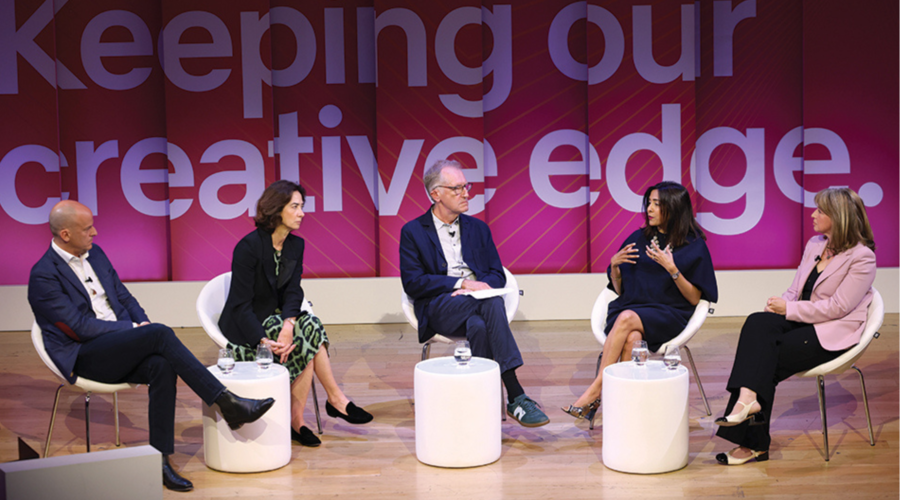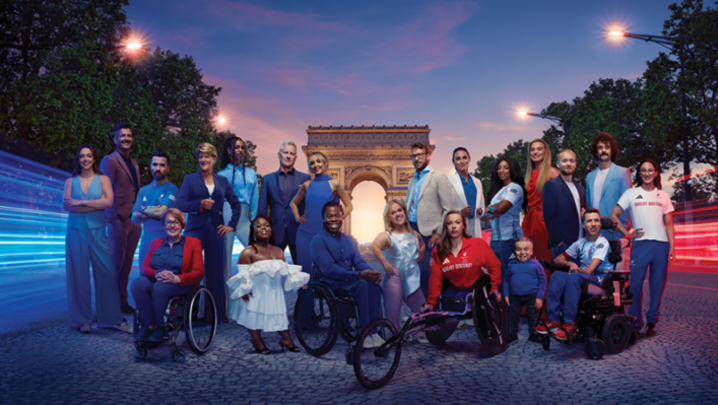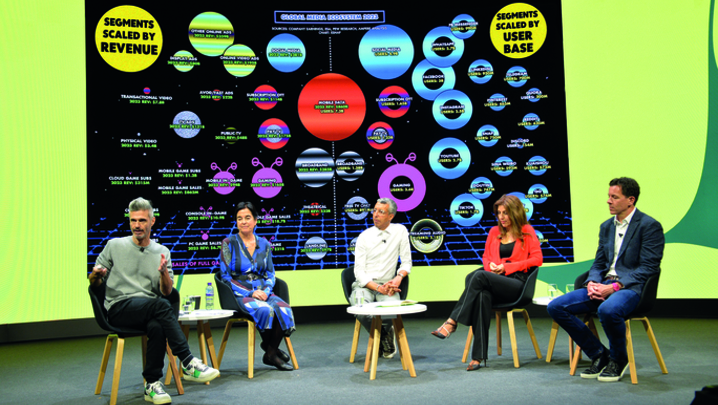Executives from four of the biggest global media houses wrestle with the eternal challenge of how to attract viewers
It’s a harder task than it once was: audiences are more fickle than ever and there’s more choice from many more outlets, whether they are broadcasters or streamers. But there were many potential answers – among them, authentic local programming, sport, live shows, brand recognition and greater consumer choice – offered by the panellists in an informative session.
“The world’s fragmenting,” said Sky’s Cécile Frot-Coutaz. And that, she explained, changes the way a broadcaster commissions and acquires programmes. “Increasingly we have tribes. If you try to do things that work for everybody, you end up not finding anybody.”
Analysing data “only goes so far”, Frot-Coutaz added. “At the end of the day, you’re backing creative people who you believe have something to say that will do it authentically.”
![A text box with the headline "Olympics was a winner for Warner Bros." The main body of text is as follows. Andrew Georgiou: ‘Paris hosted a fabulous Olympic Games – and one that I think the Olympic movement needed after quite a tough few cycles. We broadcast the Olympics in 47 markets in 19 different languages, so 3,000 people pulling together, over 12,000 commentary sessions. It was a huge logistical, operational challenge for us but it outperformed all our expectations on almost every one of our platforms…. Having it in the time zone of Europe certainly helped. ‘If you take our streaming platform, Max, which was launched in Europe in 25 markets just before the start of the Olympics, we’ve had a huge uplift in audiences, and also on Discovery+ in the markets where we haven’t launched Max yet. ‘We surpassed out total subscriber numbers after day four [of the Olympics], compared with… the entirety of the Tokyo games… On linear… in the UK, for example, we had 100% growth in linear audiences… ‘The challenge , of course, is keeping the customers. The good news for us… is that what we’ve seen on Max in particular when compared to something like Discovery+, which is a completely different proposition, is that those customers who’ve come on [to the platform] to watch the Olympics… have watched twice as much [other] content on Max as they have on Discovery+, with, of course, House of the Dragon leading that across Europe. As a result, we are retaining twice as many as we are across Discovery+.’ John Gapper: ‘That’s [demonstrating the importance] of sport or live [shows]?’ Andrew Georgiou: ‘Live does attract audiences… like no other content. The shift of entertainment content to VoD viewing is a well-trodden path… but there are moments like the Olympics that focus a global population on a single event, and what that creates in terms of a cultural impact, I think, only live [coverage] can really achieve.’](/sites/default/files/imce/screenshot_2024-10-08_at_11.01.03.png)
The session chair, Financial Times journalist John Gapper, asked Disney’s Nami Patel how her company bundles content as a means of attracting viewers. “Bundling does offer more choice to the consumer,” she said.
When Disney+ launched in the UK in 2020, its programming revolved around global brands such as Disney, Pixar and National Geographic; since then, it has added entertainment shows from the likes of FX and ABC, and now original local content.
“We’ve constantly evolved and wanted to cater for all audiences on… Disney+,” said Patel. “People are often surprised to find that half our consumers are households without kids.”
Last November, Disney launched multiple price plans, giving “choice to consumers [and] more flexibility, more value for money”, she added.
In the opening session, Netflix Co-CEO Ted Sarandos had said he wouldn’t want to run a legacy TV business; Channel 5’s Sarah Rose took a different view: “I’m proud to be a legacy business; I don’t see it as a pejorative term at all – I see it as heritage.
“The audience don’t think of us as legacy media – they just turn the telly on. That’s why the Media Act is so important for us, so when they turn the telly on, they find us because we don’t have the deep pockets to pay for that prominence. But whether they watch something live or on-demand, whether they watch a piece of content of ours on someone else’s platform or on our own, it doesn’t matter, as long as they find it. What does matter is the brand you exploit it under.”
She went on to define the Channel 5 brand: “It’s accessible, unpretentious; it’s very British, it’s regional.”
“Is it cheap?” asked Gapper.
“No,” replied Rose, “it’s not cheap; it is down to earth though… I don’t know what cheap is; all I know is that we know what we’re about editorially.”
Like many speakers during the day, Rose pinpointed local programming as the key to winning audiences. “Channel 5 is truly local – Ted [Sarandos] caters for 190 countries; I cater for one. If that content ends up having a life in other territories… brilliant, but our job is to reach the outer regions and the broad base of the UK.”
Warner Bros. Discovery’s Andrew Georgiou agreed, adding: “Our commissioning team thinks local first. If we go through a greenlight process, then the decision is made based on the home market. You’ve got to think about the audience you’re trying to tell the story for, then – and I think Ted said it really well – you hope it travels internationally.
“If you ask Netflix, I’m sure they would say they tried to recreate Squid Game a thousand times but you just can’t – it’s a genuinely local story that found a global audience.”
Frot-Coutaz added: “The fact that local works better is not a new insight – it’s always been the case. At one point, because of the advent of global streamers, the debate got a little muddled.” Sky’s most-watched shows tended to be original and local, such as Brassic and Gangs of London.
The UK’s indies and studios are currently under pressure as commissioning has dipped, but Patel argued that the “market is still very buoyant in terms of attracting investment”. Disney plans to invest $1bn a year over the next five years in the UK and Europe, the Middle East and Africa (EMEA).
Frot-Coutaz said: “A couple of years ago, the mood music was, ‘We need more studio space in the UK’ – that is not true any more… As an owner of studio space at Sky, we’re not pessimistic, but for now we’re cautious.” She called on the Government to continue supporting the production ecosystem through “tax breaks and relief on business rates”.
“We’re a little bit more optimistic than that,” said Georgiou. Warner Bros. Discovery was continuing to invest in Leavesden Studios “because we believe over the long period of time that the competitive nature of the UK market will continue to attract more and more productions. I don’t think we should underestimate the price advantage of producing content in the UK, especially versus the US.”
“We have to keep the grass roots in work so it can grow into working on the bigger productions”
Channel 5’s Rose was unconvinced: “I don’t think it’s that rosy and we have to be careful not to tell ourselves it is.”
High-end drama may be attracting strong investment but Rose’s channel operates on a different scale, tending to work with small production companies, many of which are struggling. “There is a freelance crisis at the moment… we have to keep the grass roots [of the industry] in work so it can grow into working on the bigger productions,” she added.
Frot-Coutaz agreed: “The independent production community has been suffering in the last 18 months. The reason the UK has this creative edge is that there is this community that does absolutely incredible work, sustained and created historically through the public service broadcasters. It needs to be… protected.”
For Patel, Disney’s success lay in the combination of its “beloved global brands and franchises” and “fantastic local stories”. Both parts were underpinned by “authentic storytelling that connects minds and hearts”.
Patel concluded: “We’re completely embedded in the local ecology in every market, and, for us, partnering with the broadcasters and helping sustain [these] ecologies is critical.”
Session Two: ‘How to win audiences and influence them’ was chaired by Financial Times Chief UK Business Columnist, John Gapper. Panellists were: Cécile Frot-Coutaz, CEO, Sky Studios and Chief Content Officer, Sky; Andrew Georgiou, President and MD, Warner Bros. Discovery UK & Ireland and Warner Bros. Discovery Sports Europe; Nami Patel, Senior Vice President, Strategy and Business Development, The Walt Disney Company EMEA; and Sarah Rose, President, Channel 5 and UK Regional Lead, Paramount. The producer was Helen Scott.






